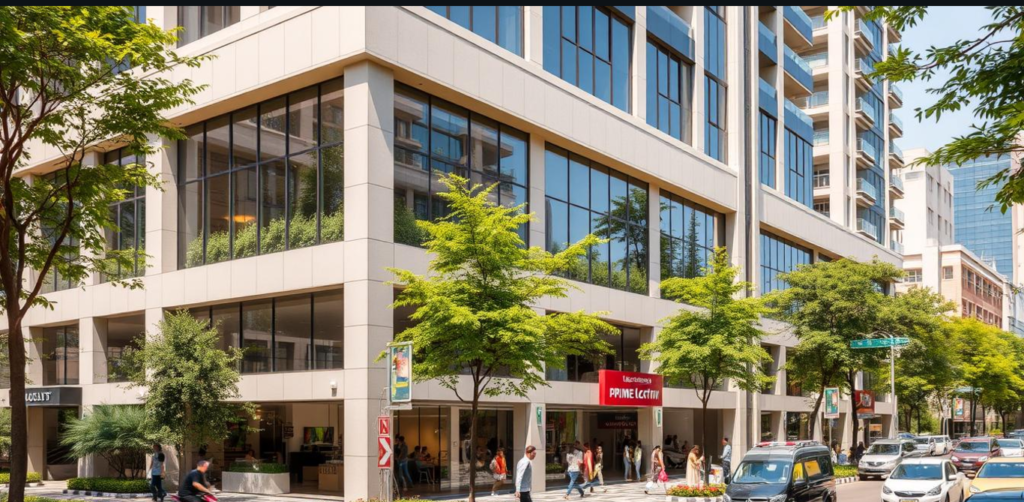Co-working spaces have become a popular trend in recent years, revolutionizing the way people work. These spaces offer a flexible and collaborative environment for freelancers, startups, and even established companies.
They provide individuals and teams with access to shared office amenities, fostering productivity and innovation. In this article, we’ll explore case studies of successful co-working spaces to understand what makes them thrive and how they benefit their members.
WeWork
WeWork is one of the most well-known co-working companies globally, with locations in numerous cities worldwide. Founded in 2010 by Adam Neumann and Miguel McKelvey, WeWork quickly gained prominence for its sleek and modern office spaces. The success of WeWork can be attributed to several key factors:
| Name | WeWork |
| Founded in | 2010 |
| Founded by | Adam Neumann and Miguel McKelvey |
| Majorly in cities | Global presence with locations in major cities worldwide |
- Community Building: WeWork places a strong emphasis on community building. They organize events, workshops, and networking opportunities, allowing members to connect and collaborate. The sense of belonging to a like-minded community enhances the co-working experience.
- Location, Location, Location: WeWork strategically selects prime locations in major cities, making it convenient for members to access public transport, restaurants, and other amenities.
- Flexible Memberships: WeWork offers a range of membership options, from hot desks to private offices. This flexibility caters to the diverse needs of their members, whether they\’re solopreneurs, small teams, or larger companies.
- Aesthetic Appeal: WeWork’s interior designs are known for their aesthetic appeal. The spaces are stylish and functional, creating a pleasant and productive work environment.
The Wing
The Wing is a co-working space designed exclusively for women. Launched in 2016 by Audrey Gelman and Lauren Kassan, it has garnered attention for its unique approach. The success of The Wing can be attributed to:
| Name | The Wing |
| Founded in | 2016 |
| Founded by | Audrey Gelman and Lauren Kassan |
| Majorly in cities | Multiple locations in various cities, mainly in the United States |
- Focused Niche: The Wing caters specifically to women, creating a safe and supportive environment. This niche approach helps foster a strong sense of community and belonging.
- Diverse Amenities: Beyond traditional co-working spaces, The Wing offers various amenities, including beauty rooms, lactation rooms, and a library. These amenities cater to the unique needs of their target audience.
- Events and Programming: The Wing hosts events and programs that focus on women’s empowerment, further enhancing its sense of community. This includes talks, workshops, and social gatherings.
- Stylish Interior: The Wing’s interior design is chic and Instagram-worthy, making it a desirable place to work and socialize.
Second Home
Second Home is a co-working space that prioritizes sustainability and well-being. Founded by Rohan Silva and Sam Aldenton, Second Home distinguishes itself with the following features:
| Name | Second Home |
| Founded in | Not specified, but multiple locations opened in recent years |
| Founded by | Rohan Silva and Sam Aldenton |
| Majorly in cities | Various locations, primarily in major European cities |
- Biophilic Design: Second Home’s spaces incorporate abundant greenery and natural light, creating a calming and productive atmosphere. Biophilic design has been shown to boost creativity and well-being.
- Diverse Community: Second Home fosters a diverse and inclusive community. Members come from various fields, promoting cross-pollination of ideas.
- Sustainability: The company takes a strong stance on sustainability, including using recycled materials in construction and implementing green technologies. This appeals to environmentally conscious individuals and organizations.
- Cultural Events: Second Home hosts cultural events, exhibitions, and talks that contribute to a vibrant and dynamic environment.
CIC (Cambridge Innovation Center)
CIC, founded by Tim Rowe in 1999, has established itself, as a hub for innovation and entrepreneurship. It’s known for supporting startups and technology companies. CIC’s success can be attributed to the following factors:
| Name | CIC (Cambridge Innovation Center) |
| Founded in | 1999 |
| Founded by | Tim Rowe |
| Majorly in cities | Multiple locations, often near prestigious universities and tech hubs |
- Proximity to Universities: CIC strategically locates its co-working spaces near prestigious universities, making it an attractive option for students, researchers, and entrepreneurs seeking to bridge the gap between academia and business.
- Mentorship and Resources: CIC offers mentorship programs and access to a wide array of resources, including laboratories and prototyping facilities, crucial for tech startups.
- Networking Opportunities: With a focus on technology and innovation, CIC fosters extensive networking opportunities. The community is filled with experts and professionals in various tech-related fields.
- Investor Connections: CIC’s strong network includes connections to investors and venture capitalists, providing startups with essential funding opportunities.
Huckletree
Huckletree, founded by Gabriela Hersham, is a co-working space that caters to the tech and creative industries. Its success is attributed to the following factors:
| Name | Huckletree |
| Founded in | Not specified, but founded in recent years |
| Founded by | Gabriela Hersham |
| Majorly in cities | Multiple locations, mainly in major cities with a focus on tech and creative industries |
- Industry-Specific Focus: Huckletree specializes in tech and creative industries, creating a niche that appeals to startups and professionals in these fields.
- Collaboration Opportunities: The layout of Huckletree spaces is designed to,,, encourage collaboration and networking among its members. Open spaces and communal areas promote interaction.
- Events and Workshops: Huckletree hosts a wide range of events, workshops, and panel discussions related to tech and creative industries, providing valuable knowledge-sharing opportunities.
- Mentorship and Support: Huckletree provides mentorship and support to its members, aiding them in their growth and development.
Some Related Posts
Wrapping Up
Successful co-working spaces offer much more than just a place to work. They build communities, offer flexible solutions, and provide unique amenities that cater to the specific needs and interests of their members.
Whether it’s WeWork’s global presence, The Wing’s focus on women’s empowerment, Second Home’s commitment to sustainability, CIC’s support for tech startups, or Huckletree’s industry-specific focus, each co-working space has its own unique formula for success.
By understanding what makes these spaces thrive, we can gain valuable insights into how to create and sustain successful co-working environments that benefit individuals and communities alike.



